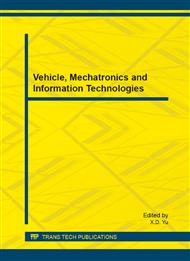p.2135
p.2139
p.2143
p.2147
p.2152
p.2157
p.2161
p.2165
p.2169
Resolving Unordered Issues for CMT-SCTP in Heterogeneous Wireless Network
Abstract:
Concurrent Multi-path Transfer extension of the Stream Control Transport Protocol (CMT-SCTP) has great potential to improve the utilization of scarce network bandwidth resource. Traditional CMT-SCTP adopts Round Robin (RR) algorithms to carry out packet scheduling that could affect the performance of SCTP traffic as unordered issues. In this paper, we discuss the unordered issues and propose a novel packet scheduling algorithm to improve the performance in heterogeneous wireless network. Our main idea is predicting the packet arriving time and then provides a path selection strategy. Through measuring round-trip time (RTT) and available bandwidth, we achieve an algorithm to predict the arriving time of data packets on one path, then give a reasonable path selection strategy to make sure that data arrives in the right order. By using proposed algorithm, the unordered packets and receive buffer blocking are reduced. We evaluate the performance of our algorithm by comparing it with the RR algorithm and show that it can resolve several performance issues.
Info:
Periodical:
Pages:
2152-2156
Citation:
Online since:
August 2013
Authors:
Keywords:
Price:
Сopyright:
© 2013 Trans Tech Publications Ltd. All Rights Reserved
Share:
Citation:


